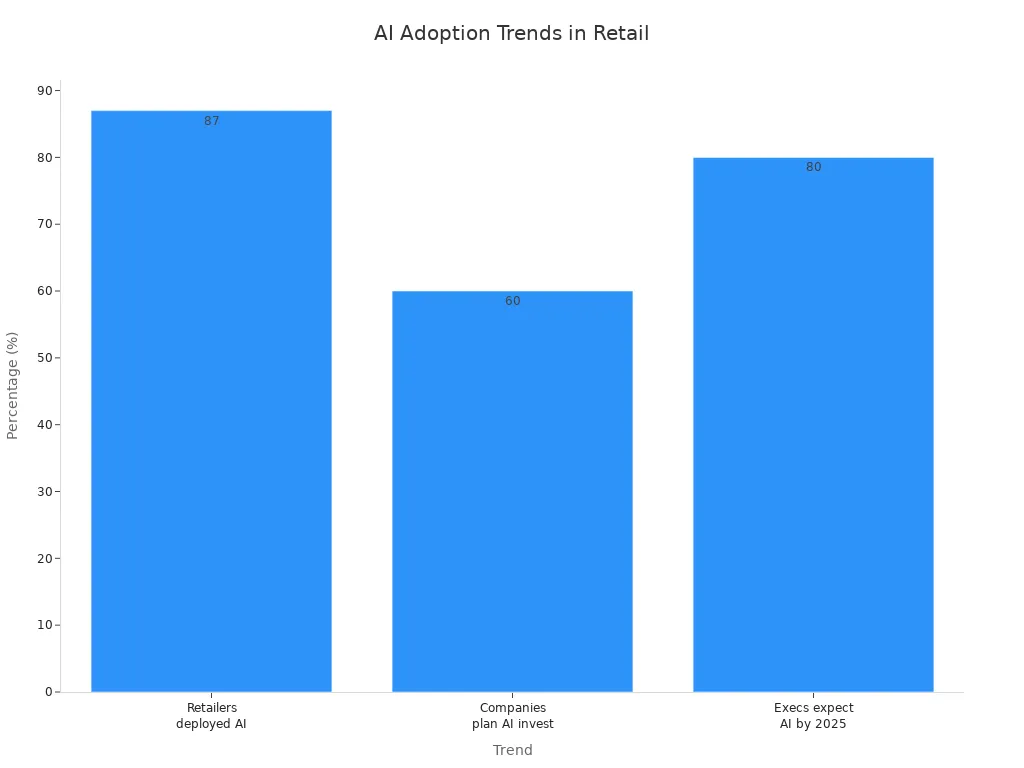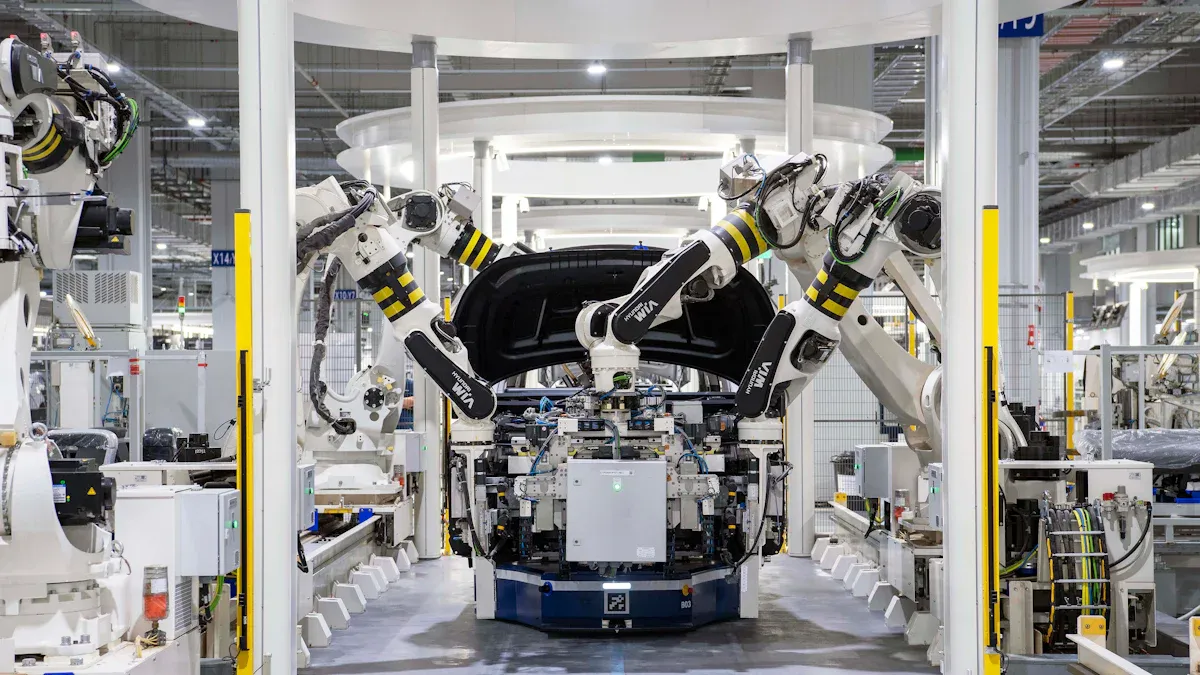5 Skills to Command a Higher AI Tech Salary in Retail Automation

Wondering how you can boost your AI Tech Salary in retail automation? Focus on five key skills: data science, machine learning engineering, NLP, RPA, and AI ethics. Mastering these areas can open doors to higher pay and more opportunities. Take a moment to think about where you stand now. Set a goal to level up your expertise and watch your value in the field grow.
Key Takeaways
Master key skills like data science, machine learning, NLP, RPA, and AI ethics to increase your value in retail automation.
Focus on learning advanced AI skills, as routine jobs are being automated. This will help you stay relevant and earn more.
Build a strong portfolio showcasing real projects. Highlight your skills and results to attract potential employers.
Networking is crucial. Connect with industry professionals to discover job opportunities and gain insights.
Invest time in certifications and online courses to validate your skills and enhance your job prospects.
Skills in Demand
Industry Trends
You might notice that retail automation is changing fast. Stores use more AI every year. In fact, 87% of retailers have already added AI to at least one part of their business. About 60% of retail companies plan to spend even more on AI soon. By 2025, 80% of retail executives expect their stores to use AI. There is a big skills shortage. Many companies want people who know how to work with AI, but there are not enough experts.
Statistic/Trend | Description |
|---|---|
87% | Retailers that have deployed AI in at least one area of their business. |
60% | Retail companies planning to increase AI investments soon. |
80% | Retail executives expecting AI adoption by 2025. |
Skills Shortage | High demand for AI skills exceeds available talent in the retail industry. |

AI Tech Salary Trends
You probably want to know how these skills affect your paycheck. Jobs that need AI skills pay much more. On average, you could earn nearly $18,000 more each year if you have the right skills. Some job postings offer a 28% salary premium for people who know AI. The number of AI jobs in IT and computer science dropped from 61% in 2019 to 49% in 2024. This means more industries, like retail, want AI experts.
Why These Five Skills Matter
Retail stores do not need as many people for routine jobs like cashiering or data entry. AI can do those tasks now. Companies want you to have skills that help them use AI better. If you know data science, machine learning, NLP, RPA, and AI ethics, you stand out. These skills let you work with smart systems and solve new problems. You become more valuable, and your AI Tech Salary goes up.
Tip: Focus on learning skills that help you work with AI, not just basic tech tasks. This will help you stay ahead and earn more.
Many routine jobs are at risk because AI can do them faster.
Companies need people who can work with AI, not just do simple tasks.
Human skills that help you use AI are more important than ever.
Data Science & Analytics
Definition
Data science and analytics help you turn raw data into useful information. You use math, computer skills, and business knowledge to find patterns and make smart choices. In retail automation, you look at sales numbers, customer habits, and inventory data to help stores run better.
Relevance
You see data everywhere in retail. Stores collect information from cash registers, websites, and even social media. When you know how to analyze this data, you help companies decide what products to stock, how to price items, and when to run sales. Your skills make stores more efficient and keep customers happy.
Real-world example:
Walmart uses big data analytics to manage inventory.
Their system checks real-time data from cash registers and social media trends.
This helps Walmart reduce waste, keep shelves stocked, and adjust inventory quickly.
Salary Impact
If you master data science and analytics, you stand out in the job market. Retailers pay more for people who can use data to solve problems. You can boost your AI Tech Salary by showing you know how to turn numbers into smart decisions. Companies want you because you help them save money and grow profits.
Tools
Here are some popular tools you can use in retail automation:
Tool | Features | Ideal For |
|---|---|---|
Zoho Analytics | Easy to use, great for making charts and graphs | Small to medium-sized businesses |
FineBI | Lets teams work together, handles lots of data | Large retailers |
FineReport | Makes detailed reports, automates tasks | Businesses focused on strategy |
Tableau | Shows data in pictures, predicts trends, connects to many data sources | Retailers needing deep insights |
Power BI | Handles big data, connects to many sources | Retailers managing large datasets |
Development Steps
You can build and show your data science skills by following these steps:
Learn to use tools like Excel, SQL, Power BI, Python, and R.
Create a portfolio with your own analytics projects.
Take online courses and earn certifications.
Join courses on Coursera, edX, or DataCamp.
Enter data science contests on Kaggle or DrivenData.
Share your work on a personal website or GitHub.
Tip: When you show your skills with real projects, you prove your value to employers. This helps you earn a higher AI Tech Salary.
Machine Learning Engineering

Definition
Machine learning engineering means you build systems that learn from data. You teach computers to spot patterns and make decisions. In retail, you might create models that predict what customers want or help stores manage stock.
Relevance
Retailers use machine learning every day. You see it when stores suggest products online or set prices that change with demand. If you know how to build these smart systems, you help companies sell more and waste less. Your work makes shopping easier for everyone.
Salary Impact
You can earn a lot more when you master machine learning engineering. In retail automation, salaries for these roles often range from $110,000 to $160,000 per year. Some top experts make even more. Companies pay higher AI Tech Salary because they need your skills to stay ahead of the competition.
Role | Average Salary (USD) |
|---|---|
Machine Learning Engineer | $120,000 |
Senior ML Engineer | $145,000 |
Lead ML Engineer | $160,000+ |
Note: Salary depends on your experience, location, and the size of the company.
Tools
You will use tools like Python, TensorFlow, PyTorch, and Scikit-learn. These help you build, test, and improve your models. Many engineers also use cloud platforms like AWS, Google Cloud, or Azure to run big projects.
Development Steps
Want to get hands-on experience? Try these steps:
Take online courses on Coursera or Udemy.
Join open-source projects or contribute to GitHub.
Build your own models using real retail data.
Enter machine learning competitions on Kaggle.
Share your results in a portfolio or blog.
Tip: Start small. Build a simple product recommendation system or a price prediction model. Show your work to employers. This proves you have real skills and helps you earn a higher AI Tech Salary.
Natural Language Processing (NLP)
Definition
Natural Language Processing, or NLP, helps computers understand and use human language. You use NLP when you talk to a chatbot or get product suggestions from a virtual assistant. It lets machines read, listen, and respond in ways that feel natural to you.
Relevance
NLP is changing how stores connect with customers. You see it in chatbots that answer questions any time of day. These bots help you find products, check order status, or solve problems fast. Stores also use NLP to read customer reviews and social media posts. They can spot if people feel happy, upset, or excited about a product. This helps stores fix problems and make better choices.
Example:
Many retailers use NLP-powered chatbots to handle customer questions and give product tips.
These chatbots work 24/7 and give quick answers, which makes shopping easier for you.
Some advanced bots even sense your mood. If you sound frustrated, the bot responds with care and tries to help.
Salary Impact
If you know NLP, you can earn much more in retail automation. Companies pay well for these skills because they want to improve customer service and understand feedback. NLP Engineers often make between $100,000 and $150,000 a year. NLP Scientists can earn from $154,000 up to $253,000. These roles offer a big boost to your AI Tech Salary.
Role | Salary Range |
|---|---|
NLP Engineer | $100,000 - $150,000+ |
NLP Scientist | $154,000 - $253,000 |
Tools
You can start learning NLP with these popular tools:
Python (with libraries like NLTK and spaCy)
TensorFlow and PyTorch for building models
Hugging Face Transformers for advanced language tasks
Google Cloud Natural Language API
Development Steps
Ready to build your NLP skills? Try these steps:
Take beginner courses on Coursera, edX, or Udemy.
Practice with free datasets from Kaggle.
Build a simple chatbot or run sentiment analysis on product reviews.
Share your projects on GitHub or a personal blog.
Join online forums like Stack Overflow or the Hugging Face community.
Tip: Start small. Even a basic chatbot project can show employers you know NLP.
Robotic Process Automation (RPA)

Definition
Robotic Process Automation, or RPA, lets you use software robots to do repetitive tasks. These bots work fast and never get tired. You can set them up to handle things like entering data, checking invoices, or updating records.
Relevance
RPA changes how stores run every day. You see bots taking care of boring jobs, so people can focus on helping customers or solving problems. When you use RPA, you make fewer mistakes and finish work faster. Stores save money because they don’t need extra staff during busy times. You help your team work smarter, not harder.
RPA makes your job easier and helps stores run smoothly. You get more time for important work, and stores get better results.
RPA automates repetitive tasks, improving accuracy and reducing costs.
Employees can focus on higher-value activities, which can lead to higher pay.
Labor costs drop since bots handle extra work during peak seasons.
Automation cuts down on errors, so stores follow rules and keep records straight.
Bots finish tasks quickly, making stores more efficient.
Salary Impact
If you know RPA, you stand out in retail automation. Companies pay more for your skills because you help them save money and work faster. Here’s what you can expect:
Role | Average Salary | Additional Cash Compensation | Total Compensation |
|---|---|---|---|
RPA Developer | $5,444 | $92,799 |
Role | Average Salary | Hourly Rate | Top 10% Salary | Bottom 10% Salary |
|---|---|---|---|---|
RPA Engineer | $90,875 | $43.69 | Over $117,000 | Under $62,400 |
If you master RPA, you boost your AI Tech Salary and open doors to better jobs.
Tools
You can learn many RPA platforms that stores use every day:
UiPath
Automation Anywhere
Pega
NICE
Tungsten Automation
SAP
Appian
IBM
Microsoft Power Automate
SS&C Blue Prism
UiPath and Automation Anywhere are the most popular choices in retail.
Development Steps
Ready to build your RPA skills? Try these steps:
Pick one RPA platform and learn the basics.
Watch tutorials and take online courses.
Build a simple bot to automate a retail task, like updating inventory.
Share your project on GitHub or a personal website.
Join RPA forums to ask questions and get advice.
Tip: Start with small projects. Show how your bots save time or reduce mistakes. This proves your value to employers.
AI Ethics & Policy
Definition
AI ethics and policy help you make sure that technology in retail treats people fairly and keeps their information safe. You look at how stores use data, how they make decisions, and how they follow rules. This skill helps you build trust with customers and avoid problems.
Relevance
AI-driven retail is growing fast. You see more stores using smart systems to track shopping habits and manage inventory. But customers worry about how their data gets used. In fact, 84% of shoppers say they prefer brands they trust to protect their personal information. If you focus on ethics, you help your company build that trust.
Transparency in data use builds strong relationships with shoppers.
Consent management lets customers know how their data is used.
Following privacy laws keeps your company out of trouble and keeps customers happy.
If you ignore ethics, you risk losing customers and facing big fines. You also want to avoid problems like biased decisions or data leaks.
Compliance risk: Not following privacy laws can lead to big penalties.
Data breach risk: Hackers can steal sensitive information and hurt your store’s reputation.
Biased decision-making: AI can make unfair choices if you train it with the wrong data.
Salary Impact
When you show expertise in AI ethics and policy, you can earn more. Companies want people who keep them safe and trusted. Here’s what you might earn:
Experience Level | Salary Range |
|---|---|
Entry-level | |
Mid-level | $90,000 - $120,000 |
Senior | $130,000 - $180,000 |
Where you live matters. Tech hubs like Silicon Valley pay more.
High demand for ethics experts can push salaries up.
Your experience and job title also affect your pay and AI Tech Salary.
Tools
You can use frameworks to guide your work in AI ethics:
Framework Name | Description |
|---|---|
Helps you make sure AI systems are ethical, focusing on trust and accountability. | |
IEEE’s Ethically Aligned Design | Puts people first when building smart systems, making sure technology helps everyone. |
Development Steps
You can show your skills in AI ethics and policy by:
Involving workers in decisions about automation.
Investing in training programs so employees can learn new skills.
Checking how automation affects workers and communities before you start.
Encouraging people and machines to work together, not just replace jobs.
Building a culture where everyone keeps learning and growing.
Tip: Share your ideas and projects on LinkedIn or at industry events. This shows you care about ethics and helps you stand out.
Career Positioning
Portfolio
Your portfolio is your chance to shine. Show what you can do with real projects. Pick projects that solve real problems in retail, like predicting sales or building a chatbot. For each project, write a short description. Explain what you wanted to do, how you did it, and what happened. Add charts or graphs to make your results easy to see. Share your code on GitHub and keep it organized with a README file. Write blog posts about your work to show your passion and help others learn. Add a section that lists your skills, like Python, TensorFlow, or Power BI. Don’t forget your contact info and a short “About Me” section. A strong portfolio shows you have the skills companies want.
Certifications
Certifications help you stand out. They show you know your stuff. Look for certificates in data science, machine learning, NLP, RPA, or AI ethics. Many top companies and schools offer online courses. Try Coursera, edX, or Udemy. Earning a certificate proves you can use the tools and solve real problems. Add your certificates to your portfolio and LinkedIn profile. This makes it easy for employers to see your skills.
Networking
Networking opens doors. Most jobs come from people you know, not just job boards. Go to meetups, join online groups, and talk to others in the field. Use LinkedIn to connect with people who work in retail automation. Ask questions and share your projects. AI can help you find new contacts and keep track of your connections. Build real relationships, not just a big contact list. Personal recommendations can help you get past automated job filters.
Specialization
Specializing in one skill can boost your AI Tech Salary. Focus on what you love, like machine learning or RPA. Companies want experts who know both retail and AI. If you combine your industry knowledge with a deep skill, you become very valuable. As more stores use AI, the need for skilled people will keep growing. Pick your favorite area and become the go-to person for that skill.
You now know the five skills that can boost your AI Tech Salary in retail automation. When you learn new things and stay flexible, you set yourself up for success. People with basic AI skills earn up to 24% more. If you spend just five hours a week learning, you can see almost 50% more wage growth and worry less about losing your job. Start building these skills today and watch your career take off!
FAQ
What is the best way to start learning AI for retail automation?
You can begin with free online courses. Try simple projects like building a chatbot or analyzing sales data. Practice often. Share your work on GitHub. Ask questions in online forums. You will learn faster by doing.
Do I need a college degree to get a high-paying AI tech job?
A degree helps, but it is not required. Many employers care more about your skills and projects. Certifications, a strong portfolio, and hands-on experience can help you stand out.
Which programming language should I learn first for AI in retail?
Python is the top choice. It is easy to read and has many libraries for AI, data science, and automation. Start with Python basics, then move to tools like TensorFlow or PyTorch.
How can I show my AI skills to employers?
Build a portfolio with real projects.
Write short descriptions for each project.
Add charts or code samples.
Share your work on LinkedIn and GitHub.
Employers love to see what you can do, not just what you know.
See Also
Understanding AI-Driven Convenience Stores for Retail Success
Launching an AI-Enhanced Corner Store on a Budget
The Future of Retail: Embracing AI-Driven Stores
Revolutionizing Online Retail Management with AI Tools
Modern Retail Benefits from AI-Enhanced Combo Vending Machines
